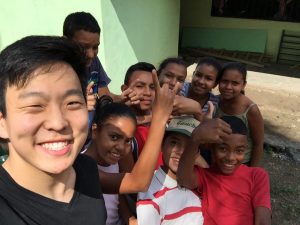In the spring of 2016, I traveled to a rural village in Honduras with a small team of Dartmouth students and the organization ACTS Honduras. It was my first significant experience traveling abroad and being immersed in a different culture. As a Korean-American college student from the suburbs of Chicago, “different” is an understatement. But after a week of providing dental hygiene resources, teaching my group of twelve-year-old students, and playing with the village children, I found myself in love with rural Honduras. Everything from the food to the dancing to the beautiful mountains, I loved being there.
On our last night, a boy of about eight sneaked out to where my teammates and I were sitting. During greetings, he referenced me as “el chino de japón” which means the Chinese person from Japan. His only knowledge of people who looked like myself were Jackie Chan movies and names on a map, so when I walked him home I asked him if his life was like a movie. When he replied no, I said, “entonces, es ridiculo que mi vida sea como una pelicula” or “then, it’s ridiculous that my life is like a movie.” I explained how people who might look the same aren’t, and you can’t assume anything about a stranger without getting to know them. I used to share this story as an example for the good a foreigner can do in a genuine cross-cultural exchange. It’s a story about breaking stereotypes and empathizing with people regardless of what they look like. It’s a good story. But it’s my story.
What I mean is, what did I really do while I was in Honduras? Will this child really grow up without stereotypes towards Asians? Even so, he will probably never see an Asian person besides volunteers – doesn’t that also build a single story? I did work that any other first-time international volunteer could have done. Yes, I learned a lot from that trip such as the value of another culture and the great work international service organizations can contribute to a community.
But, why do it again?
I found myself asking this question in preparation to travel to Nicaragua. I had learned my lesson, but is it ethical for me to go back? Is there anything more I can contribute? Shouldn’t someone else go in my place? As I continue to prepare for this trip by learning about Nicaragua and international travel, I am figuring out my role as “el chino de Japón” in international volunteering. I’m checking myself from becoming a ‘voluntourist’, and making a careful plan out of my good intentions to truly do good for those I intend to serve.
This website documents my growth, my plans, and my goals for what I hope is a productive and, most importantly, an ethical journey to Nicaragua with the non-profit organization Bridges to Community. Please explore this site to learn more about me and what I and my fellow classmates have been learning in our class, “The Politics and Ethics of Development in Latin America: The Nicaraguan Context”, offered by the Latin American and Caribbean Studies Department of Dartmouth College and the Dartmouth Center for Service.
